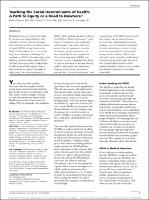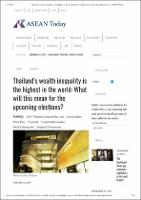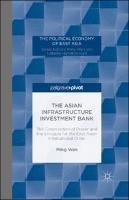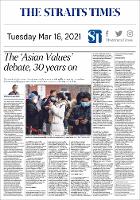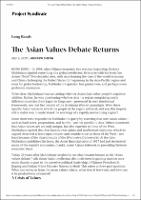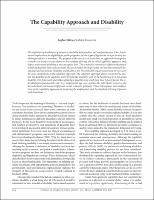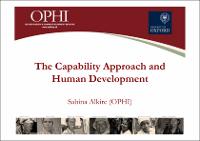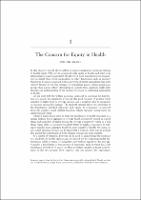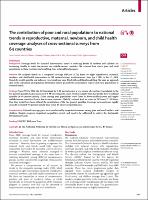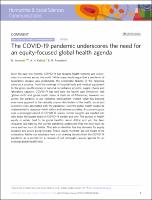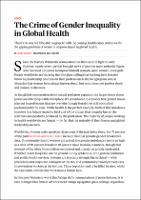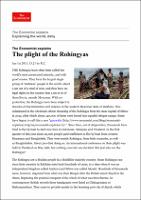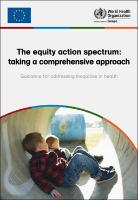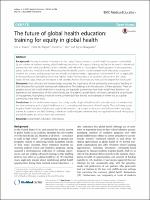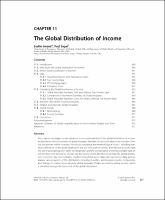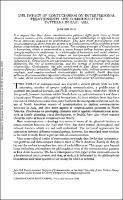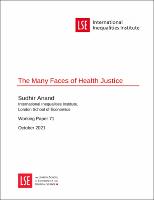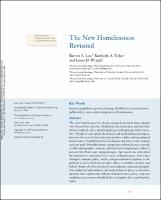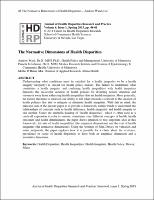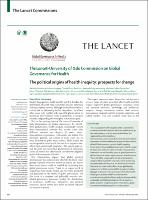Browsing by Title
Now showing items 184-203 of 229
-
Teaching the Social Determinants of Health: A Path to Equity or a Road to Nowhere?
Medical schools are increasingly called to include social responsibility in their mandates. As such, they are focusing their attention on the social determinants of health (SDOH) as key drivers in the health of the patients and communities they serve. However, underlying this emphasis on SDOH is the assumption that teaching medical students about SDOH will lead future physicians to take action to help achieve health equity. There is little evidence to support this belief. In many ways, the current approach to SDOH within medical ... -
Thailand’s wealth inequality is the highest in the world: What will this mean for the upcoming elections?
(United Nation ESCAP, 2019-01-16) -
The Asian Value Debates - 30 years on
(The Straits Times, 2021) -
The Asian Values Debate Returns
(Project Syndicate, 2018) -
The Capability Approach and Disability
(JOURNAL OF DISABILITY POLICY STUDIES)
The definition of disability is of interest to disability policymakers and analysts because it has fundamental implications for eligibility for public programs, for the scope of legislation, and for the way disability prevalence is measured. The purpose of this article is to assess how an approach developed in economics to analyze issues related to the standard of living, the so-called capability approach, may help us understand disability at the conceptual level. The article first summarizes different theoretical models of disability (the ... -
The Capability Approach and Human Development
(OPHI : Oxford Poverty & Human Development Initiative) -
The Concern for Health Equity
(Oxford University Press 2004, 2004) -
The contribution of poor and rural populations to national trends in reproductive, maternal, newborn, and child health coverage: analyses of cross-sectional surveys from 64 countries
(The Lancet Global Health, 2017)
Background Coverage levels for essential interventions aimed at reducing deaths of mothers and children are increasing steadily in most low-income and middle-income countries. We assessed how much poor and rural populations in these countries are benefiting from national-level progress. -
The COVID-19 pandemic underscores the need for an equity-focused global health agenda
(2021-12)
Over the past few months, COVID-19 has ravaged health systems and economies in countries across the world. While many would argue that a pandemic of respiratory disease was predictable, the systematic failures of the response came as a surprise. From the shortage of hospital beds and medical equipment to the gross insufficiencies in national surveillance systems, supply chains and laboratory capacity, COVID-19 has laid bare the health care limitations that ‘global north’ and ‘global south’ share. A stark set of differences, however, run across ... -
The Crime of Gender Inequality in Global Health
(Voice-Foreign Policy) -
The Economist explains_ The plight of the Rohingyas
(The Economist, 2015) -
The equity action spectrum: taking a comprehensive approach : guidance for addressing inequities in health
(World Health Organization, Regional Office for Europe, 2014)
While population health indicators have improved across Europe overall, that improvement has not been experienced equally everywhere, or by all. This is one of a series of policy briefs that describe practical actions to address health inequities, especially in relation to tobacco, alcohol, obesity and injury, the priority public health challenges facing Europe. It offers policy-makers and public health professionals the tools and guidance to implement the Health 2020 vision – the new health policy framework for Europe developed by WHO/Europe ... -
The future of global health education: training for equity in global health
(BMC Medical Education, 2016)
Background: Among academic institutions in the United States, interest in global health has grown substantially: by the number of students seeking global health opportunities at all stages of training, and by the increase in institutional partnerships and newly established centers, institutes, and initiatives to house global health programs at undergraduate, public health and medical schools. Witnessing this remarkable growth should compel health educators to question whether the training and guidance that we provide to students today is appropriate, ... -
The Global Distribution of Income
(Elsevier, 2015)
This chapter investigates recent advances in our understanding of the global distribution of income, and produces the first estimates of global inequality that take into account data on the incomes of the top one percent within countries. We discuss conceptual and methodological issues – including alternative definitions of the global distribution, the use of household surveys and national accounts data, the use of purchasing power parity exchange rates, and the incorporation of recently available data on top incomes from income tax records. We ... -
The impact of Confucianism on interpersonal relationships and communication patterns in east Asia
(Communication Monographs, 1988)
It is argued that East Asian communication patterns differ from those of North America because of the Eastern emphasis on social relationships as opposed to the North American emphasis on individualism. This East Asian preoccupation with social relationships stems from the doctrines of Confucianism, which considers proper human relationships to be the basis of society. The cardinal principle of Confucianism is humanism, which is understood as a warm human feeling between people and strongly emphasizes reciprocity. As a philosophy of humanism and ... -
The Many Faces of Health Justice
(The London School of Economics and Political Science, October 20)
This paper develops the idea of health justice as a plural conception. It draws on the literature on justice from philosophy and economics, and investigates its application and reach in the space of health. Several distinctions are invoked in identifying and contrasting different facets of health justice and injustice. These include active versus passive injustice; process fairness versus substantive justice; comparative versus noncomparative justice; compensatory and distributive justice. Within distributive justice, the health implications of ... -
The New Homelessness Revisited
(Annual Review of Sociology, 2010)
The new homelessness has drawn sustained attention from scholars over the past three decades. Definitional inconsistencies and data limitations rendered early work during this period largely speculative in nature. Thanks to conceptual, theoretical, and methodological progress, however, the research literature now provides a fuller understanding of homelessness. Contributions by sociologists and other social scientists since the mid-1990s differentiate among types of homelessness, provide credible demographic estimates, and show how being homeless ... -
The Normative Dimensions of Health Disparities
(Journal of Health Disparities Research and Practice, 2013)
Understanding what conditions must be satisfied for a health inequality to be a health inequity (disparity) is crucial for health policy makers. The failure to understand what constitutes a health inequity, and confusing health inequalities with health inequities threatens the successful creation of health policies by diverting needed attention and resources away from addressing health inequalities that are health inequities. More generally, the failure threatens to undercut our ability to tell what research is relevant to the creation of health ... -
The political origins of health inequity: prospects for change
(The Lancet, 2014-02-11)
Despite large gains in health over the past few decades, the distribution of health risks worldwide remains extremely and unacceptably uneven. Although the health sector has a crucial role in addressing health inequalities, its eff orts often come into confl ict with powerful global actors in pursuit of other interests such as protection of national security, safeguarding of sovereignty, or economic goals. This is the starting point of The Lancet–University of Oslo Commission on Global Governance for Health. With globalisation, health inequity ...

